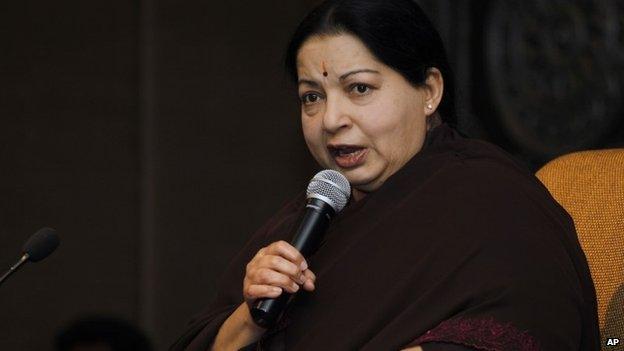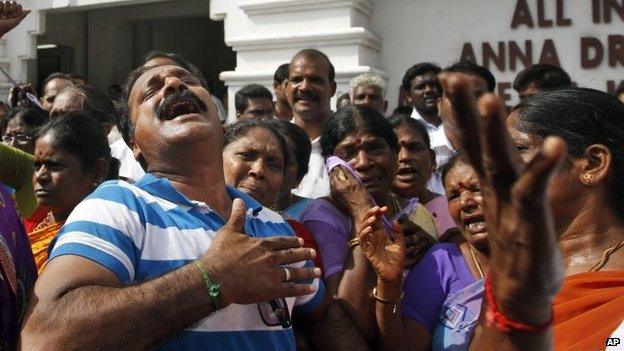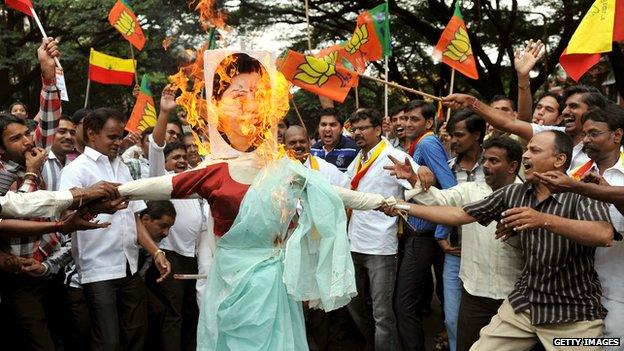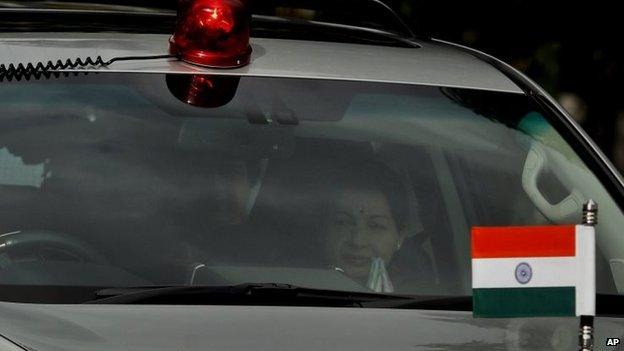Profile: Jayaram Jayalalitha
- Published

Jayaram Jayalalitha is one of India's most colourful and controversial politicians and has served as the chief minister of south India's Tamil Nadu state on numerous occasions.
The 68-year-old has been in hospital since late September, sparking worries about her health.
However, a veil of secrecy over the extent of Ms Jayalalitha's illness has triggered a wave of panic. Police have arrested two people for "spreading rumours" about her health amid fears that her supporters will resort to self harm in the event of any bad news.
A former actress, Ms Jayalalitha's career has been marked by a series of highs and lows.
Head of the regional AIADMK party, she has been elected chief minister four times.
She has alternated in power over most of this time with her great rival, 93-year-old M Karunanidhi, leader of the DMK party.
Dramatic comebacks
In most cases Jayalalitha's lows have been followed by dramatic political comebacks in which she has been reinstated as Tamil Nadu chief minister.
A Karnataka high court order in 2015, which cleared her of involvement in a corruption scandal, paved the way for her return to power after a setback in September 2014 when a trial court found her guilty for corruption and gave her a four-year jail sentence.
She had to resign as chief minister and spent three weeks in prison, in one of the toughest challenges of her political career.
But it was not the first time she had been sent to prison for corruption - she spent a brief time in jail over corruption charges in 1996 too.
Jayalalitha's admirers say she has played a key role in the development of Tamil Nadu as one of India's most economically influential states.

Jayalalitha has the unquestioned support of thousands of people in her AIADMK party
She has championed the cause of the rural and urban poor by introducing subsidised food canteens, providing free laptops to thousands of school pupils and students and launching other populist schemes like giving away food mixers and grinders to families.
Pet projects
But critics say she has established a personality cult in Tamil Nadu over the years and indulged in an overtly over-extravagant lifestyle.
Many publicly funded projects are named after her, such as the canteens scheme.
The canteens are known as Amma Canteens - Amma in Tamil is Mother, an honorific euphemism by which Jayalalitha is addressed by her followers in the state.
These were followed by other equally populist schemes like Amma Bottled Water, Amma Salt, Amma Pharmacies and more recently, Amma Cement.
Her critics say that she has used the Tamil Nadu Marketing Corporation (TASMAC) - which has a monopoly on the sale of alcohol in the state - to pay for many of her pet projects.
The liquor policy of the state government has been criticised for impoverishing households and ruining people's health.

Many have protested against Jayalalitha's policies
The allegations made against her over the years have been extensive - from arranging for her opponents to be beaten up to spending large amounts of taxpayers' money on lavish wedding ceremonies.
Some of these allegations have veered towards the outlandish - on one occasion she was accused of losing her temper with her auditor and assaulting him.
Jayalalitha first came to political prominence in the late 1980s, although she was well known as an actress before then, starring in more than 100 films.
Naturally charismatic, she was brought into politics by the then actor-turned-chief minister, MG Ramachandran, with whom she starred in many of her films.
Three years after his death in 1987, she took over his All India Anna Dravida Munnetra Khazagham (AIADMK) party as well as the state, and proved equally adept at retaining the political base of the party.
Stories about her extravagance are legendary, and many of her worshipping followers are known to profess their loyalty through bizarre acts such as walking on hot coals or drawing her portrait with their blood.
Incidents of her followers setting fire to themselves whenever she faces political setbacks are not unknown.
Rivalry
During the various times she has served as Tamil Nadu chief minister, huge cut-outs of her figure have dominated the Tamil Nadu skyline.
Her ministers have on occasions been reported to prostrate themselves at her feet.

In September 2014 Jayalalitha had to surrender the trappings of power
During one raid on her premises following a corruption allegation in 1996, police said they had found large quantities of diamond-studded gold jewellery, more than 10,000 saris and 750 pairs of shoes.
Her emergence as an increasingly important regional politician was clearly seen in the run-up to the 2009 elections, when she threw her support behind a grouping of regional parties and communists seeking to establish a "third front" to challenge India's two main coalitions.
But throughout her career, Jayalalitha's critics have painted her as a deeply corrupt figure who has manipulated the system and sees herself as above the law.
She has been in and out of the courts, defending herself against allegations.
She also reportedly nursed ambitions of a greater national political role and in the run-up to the 2014 Indian parliamentary elections, her followers projected her as a prime ministerial candidate, though she did not openly endorse it.